Thanksgiving for dogs? Sharing our holiday feast with our furry family members is tempting, but how do you know what Thanksgiving foods dogs can eat and which are bad for dogs? Integrative veterinarian Dr. Julie Buzby breaks down which Thanksgiving foods are safe to share, and which should be avoided at all costs.
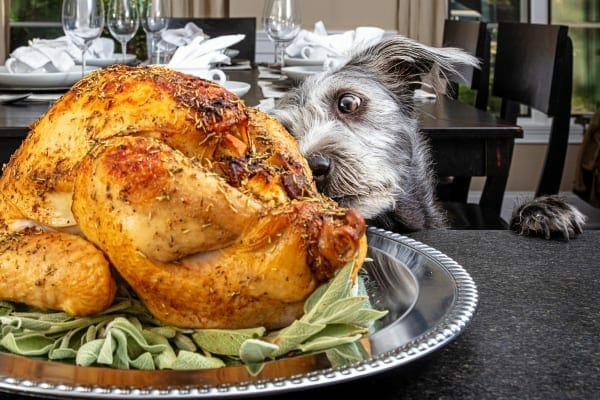
.
As a veterinarian for 25+ years, I know all too well that Thanksgiving weekend is one of the busiest times of the year for veterinary emergency hospitals. They are packed with vomiting dogs and guilt-ridden pet parents. Unfortunately, sharing the Thanksgiving feast with four-legged family members is a bad idea.
While some traditional Thanksgiving foods are safe for dogs in small amounts, others can make them sick.
So, before you pass the buttery mashed potatoes to your dog this Thanksgiving, learn which ten foods (when properly prepared) are safe for our canine companions, and which may be potentially life-threatening hazards.
10 Thanksgiving foods that are safe for dogs
First, let’s discuss the fun part and whip up a (small) plate of Thanksgiving foods dogs can eat. So, what’s on the Thanksgiving menu for dogs?
1. Unseasoned, cooked turkey
When I think about Thanksgiving dinner, I think turkey. As a veterinarian, I spend a lot of my November answering whether dogs can eat turkey. The answer is yes, you can give unseasoned, cooked turkey to dogs. However, the words “cooked” and “unseasoned” should not be overlooked.
While turkey makes my list of Thanksgiving food that’s safe for dogs, there are two very important caveats:
- Turkey must be fully cooked—As a general rule, if a raw food isn’t safe for you to eat, it’s not safe for your dog to eat either. Dogs can develop parasite or bacterial infections (like Salmonella) from eating raw, uncooked meat just like people can. Therefore, it is important to fully and properly cook any turkey that you plan to give your dog.
- Turkey must be unseasoned—While you and I may love seasoned turkey, seasonings such as garlic, onion, and even salt can be dangerous for dogs. Only plain, cooked turkey should be shared with your furry friends.
For these reasons, turkey makes both my lists: a food that is safe for dogs (when prepared properly) and a food that can be hazardous for dogs. You’ll find more on potential hazards later in this article.
2. Plain green beans (cooked or raw)
If you want to include your dog in your Thanksgiving celebrations, sharing some plain green beans is one of my favorite ways to do so! I love giving dogs green beans for many reasons. Green beans are:
- Simple, easy to prepare
- Great source of vitamins A, C, and K
- Contain important minerals like iron and calcium
- High in fiber
- Low in calories
Green beans are a healthy snack for your dog that you can give any day of the year. In fact, I often recommend them to my clients who ask how to help a dog lose weight, especially when their furry friend always seems hungry. Green beans are filling but low in calories—also making them a great snack for diabetic dogs.
When feeding green beans, they can be canned, frozen, fresh, cooked, or raw. The most important part to remember is that green beans cannot be seasoned. When shopping for canned green beans for your dog, it is important to select ones that are labeled “low sodium” or “salt free.”
Please note that I said it’s ok to give you dog green beans, and not green bean casserole. (I’ll explain more about green bean casserole later in this article.)
3. Sweet potatoes
When prepared properly and served in moderation, sweet potatoes are another dog-friendly Thanksgiving vegetable. However, many Thanksgiving sweet potato recipes are loaded with butter, marshmallows, and brown sugar. This amount of sugar would upset your dog’s stomach.
If you’d like to serve your dog sweet potatoes, follow these tips:
- Chop sweet potatoes into small bites so they are easy for your dog to swallow.
- Cook or bake sweet potatoes to make them easier for your dog to chew.
- Do not add any extra “flavor” such as brown sugar, butter, or marshmallows. Even without the extra sugar on top, sweet potatoes are still very rich and should be fed in moderation.
If you buy canned sweet potatoes instead of fresh (I’ll never tell!), keep in mind that many canned yams are packaged in syrup. To share these with your pup, make sure they are thoroughly rinsed first.
4. Cooked, white potatoes
Mashed potatoes are one of my favorite Thanksgiving sides. Although delicious, the added butter, cream, and gravy are not good for dogs. Fortunately, plain, cooked white potatoes are fine to share! Before mashing and mixing potatoes to place on the Thanksgiving table, I set aside some small pieces of plain boiled potatoes for my dogs.
Just like for people, raw potatoes are not safe for dogs. Consuming raw potatoes can cause GI distress.
When cooked, white potatoes are a wonderful source of vitamins and minerals (vitamin C, vitamin B6, iron, and magnesium) that are important for your dog’s nervous and immune system.
5. Cranberries
Although some dogs may not enjoy the tart taste, plain cranberries are safe to offer. Cranberries can be fed raw, cooked, or dried. Eating too many cranberries may upset your dog’s stomach, though, so offer just a few.
If you choose to feed your dog cranberries, ensure that you are only sharing plain cranberries. Cranberry sauces and canned cranberries are often mixed with sugar, alcohol, raisins, and artificial flavorings that can be toxic and dangerous for your dog.
6. Pumpkin
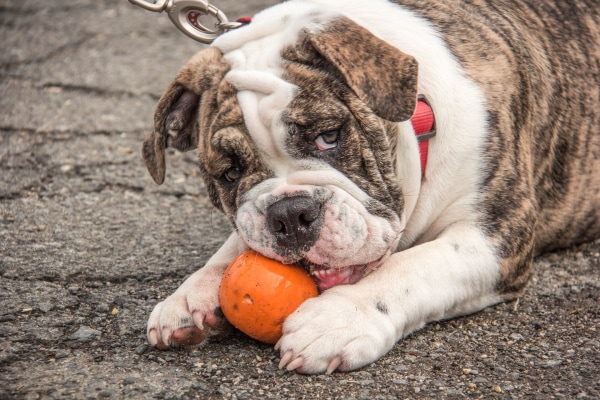
Along with green beans, canned pumpkin for dogs is another one of my go-to healthy treats. Canned pumpkin is flavorful, full of vitamins and minerals, and high in fiber and water. It has many benefits for dogs, and can even be used in a bland diet for dogs who are sick.
When feeding your dog pumpkin, there are a few important points to remember:
- Canned pumpkin is not the same thing as pumpkin pie filling. Pumpkin pie filling contains added sugar, spices, and artificial sweeteners that are dangerous for dogs. Similarly, you should not feed your dog actual bites of pumpkin pie either. (The good news? This means more pie for you!)
- Feed cooked or canned pumpkin in moderation. While pumpkin is one of my favorite 14 vegetables dogs can eat, too much can cause your dog to have diarrhea.
6. Carrots
Carrots are one of the best Thanksgiving snacks. They are very healthy for dogs, and also very tasty! These crunchy treats are a great source of potassium, vitamin B6, and beta-carotene. Beta-carotene is a compound that produces Vitamin A, which is important for the immune system and your dog’s vision.
With all these good nutrients, you can safely serve carrots to your dog on Thanksgiving whether the carrots are cooked, steamed, or raw. Just leave out any butter, brown sugar, or other seasonings.
7. Corn (but NOT corn on the cob)
Corn is a safe and fun Thanksgiving food to share with your dog. While it’s not as nutrient-dense as some of the other foods mentioned, it is full of easily digestible carbohydrates and fiber.
Although it is safe to offer your furry friend cooked kernels, you should never give dogs corn on the cob. The cob itself is not digestible. If eaten, the cob can get stuck in the stomach or intestines, causing a potentially life-threatening blockage.
Fun fact: The first foreign body I ever surgically removed from a dog was a corn cob! The dog did fine, but I’m sure her parents kept corn cobs far out of reach after that!
8. Peas
Sugar and snow peas are a great option for a snack because they are low in calories. Also, peas can promote your dog’s immune system and thyroid gland function through:
- Vitamin A
- Vitamin B
- Potassium
- Magnesium
- Zinc
10. Apple slices
Apples are another fall food that dogs can enjoy. Apples are very low in calories and fat—making them a great snack for dogs (especially seniors). They are full of vitamins and antioxidants. Plus, they are sweet, crunchy, and tasty!
Since apples are high in sugar, avoid feeding large amounts of apples or apples cooked into sugary desserts. Save the apple pie for human guests.
While it is true that apple seeds contain trace amounts of cyanide, your dog would have to eat hundreds of seeds to consume toxic levels. If your dog eats a seed or two, don’t panic, but try to offer seed-free apple pieces.
10 Thanksgiving foods that are dangerous for dogs
Now that we know what foods are safe to add to your “Pawsgiving” menu, let’s discuss Thanksgiving foods dogs shouldn’t eat.
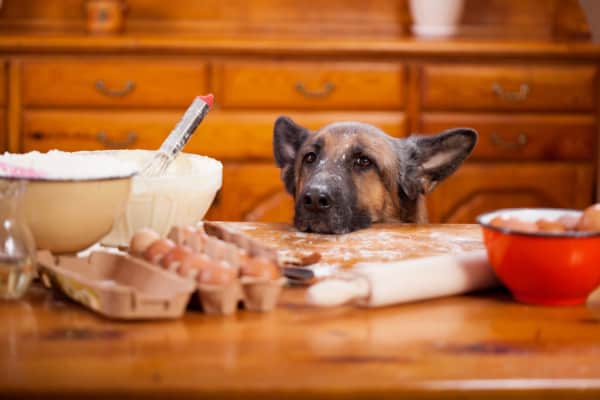
1. Unbaked bread dough
Biscuits, rolls, and other breads go well with so many holiday meals. Your dog will probably be fine if he or she steals a small piece of baked bread. However, raw bread dough can be dangerous due to the active yeast ingredient which causes bread dough to rise.
If you’re distracted by exquisite Macy’s parade floats and then return to the kitchen to find that your dog ate raw biscuit dough, your Thanksgiving plans may now include a trip to the veterinary emergency clinic.
Your dog’s stomach is a warm, dark place, acting like an incubator for yeast growth. Once eaten, raw dough begins to rise inside the stomach.
Not only does the dough’s expansion cause physical pressure, but the fermentation process releases carbon dioxide and ethanol. Carbon dioxide gas build up can cause uncomfortable bloating, and ethanol production can lead to alcohol poisoning.
If your dog snags just a small piece of dropped biscuit dough, you may be wondering how much raw dough a dog can eat safely. Unfortunately, raw dough ingestion is not necessarily dose-dependent—meaning that any amount can be potentially toxic.
If you suspect your dog has ingested unbaked bread dough, contact your veterinarian right away and take your dog to the nearest emergency hospital.
2. Grapes and raisins
Grapes and raisins are one of the more common human-food toxins we see in dogs. Any salads or side dishes containing any amounts of grapes or raisins should be kept far out of reach of furry friends.
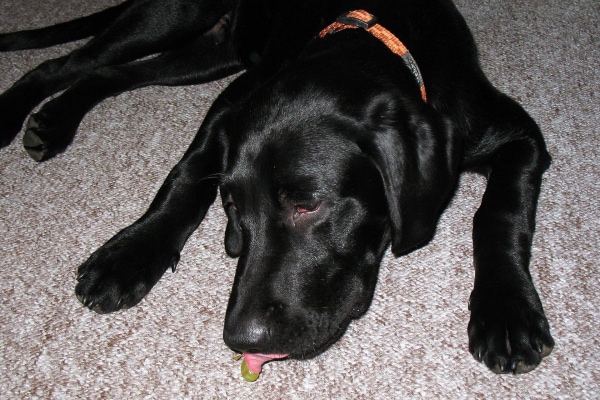
Dogs can develop kidney failure after eating raisins and grapes (even in very small quantities). It is believed that the tartaric acid present in grapes and raisins (also found in cream of tartar) is toxic to dogs. Different varieties of grapes have varying levels of tartaric acid, and individual dogs react differently to it, so any grape or raisin ingestion should be treated as an emergency.
Signs like vomiting and diarrhea may be apparent within six to twelve hours of ingestion. If you ever think that your dog might have ingested grapes or raisins, it’s important to contact your veterinarian immediately to help prevent permanent kidney damage.
3. Turkey
If you are going to feed turkey to your dog, you must do so with caution. Although we already discussed that cooked, unseasoned turkey is safe for dogs (you may even notice turkey as an ingredient in your dog’s food), fatty parts of the turkey should be avoided.
White meat is the best option, because it is leaner than dark meat. Turkey skin is also salty and fatty. High fat and salty foods can cause an upset stomach, diarrhea, and vomiting.
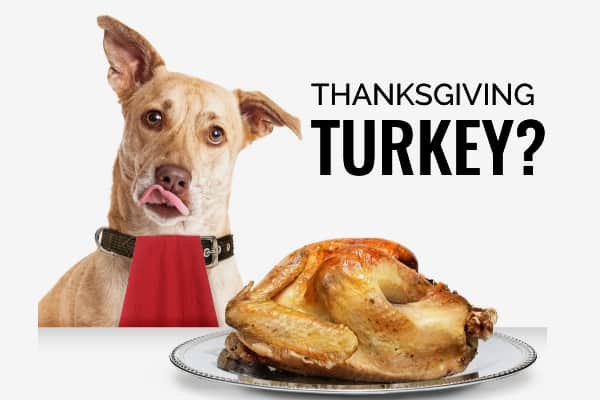
4. Ham
While talking about turkey, you might be wondering, “Can dogs eat Thanksgiving ham?”
Ham and other pork-based products are very fatty. These fatty foods can cause digestive problems, and even worse, a potentially life-threatening condition called pancreatitis in dogs.
While a few scraps of turkey might be fine, skip the ham this Thanksgiving.
5. Stuffing
Can dogs eat stuffing? No Thanksgiving turkey would be complete in our house without a side of stuffing. However, many stuffing recipes call for ingredients like garlic, onions, and chives. These ingredients are often in commercial dressings as well. Eaten in sufficient quantities, these toxic vegetables can cause anemia in dogs.
Signs of garlic, onion, and chive toxicity in dogs can take several days to become noticeable. Lethargy, pale gums, vomiting, and abdominal pain are just some of the possible clinical signs. You should relay these symptoms to your veterinarian promptly if they arise.
Stuffing is also high in sodium. Excessive salt intake can cause illness in dogs. This is why stuffing is on the list of Thanksgiving foods that are bad for dogs.
6. Mashed potatoes and gravy
As mentioned above, plain potatoes are safe for dogs in small amounts. In fact, many of the commercially available diets for dogs contain these ingredients. Does this mean that dogs can have mashed potatoes and gravy?
The answer is “no.” The “let’s-make-these-creamy-and-rich” ingredients that go into our potato recipes can be problematic. Milk products and abundant butter used for mashed potatoes and gravy have a high fat content, which can increase your dog’s risk of developing pancreatitis.
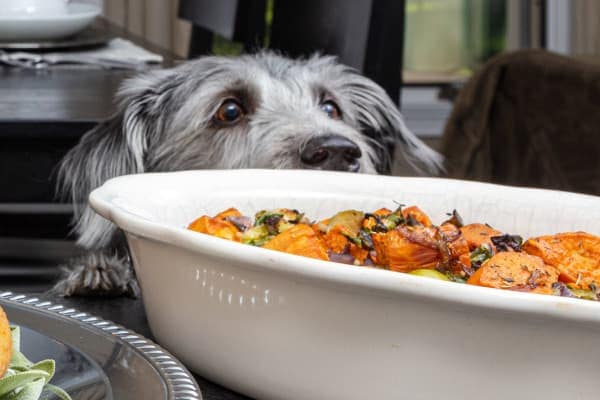
7. Buttery sweet potato casserole
Although plain, cooked sweet potatoes make an excellent treat, the added butter, brown sugar, marshmallows and other ingredients take sweet potato casserole off your dog’s Thanksgiving menu.
8. Green bean casserole and other creamy, onion-laden side dishes
Plain green beans receive an emphatic thumb’s up on our list of Thanksgiving foods for dogs, but green bean casserole should not be put on your dog’s plate. Just like stuffing, green bean casserole sometimes contains garlic and onions that are toxic to dogs.
While delicious, all the cream used in preparing casseroles is dangerous for dogs. It is fatty and usually full of seasonings, which is a recipe for disaster. Your dog could experience stomach discomfort, anemia, and risk of pancreatitis — served up all in one creamy, onion-laden side dish.
9. Bones
Many pet owners think that bones are an ideal treat for dogs because they are “natural,” flavored, and can keep a dog occupied for a long period of time. However, bones (especially ones from chicken and turkey) can splinter into sharp pieces that can injure your dog’s mouth.
If these sharp pieces are swallowed, they can perforate your dog’s stomach or small intestines, causing severe abdominal pain followed by life-threatening infection. Make sure to contact your veterinarian if your dog is showing any signs of abdominal pain and gastrointestinal upset. For a list of things your dog can safely chew, please read my article: Safe Chew Toys for Dogs.
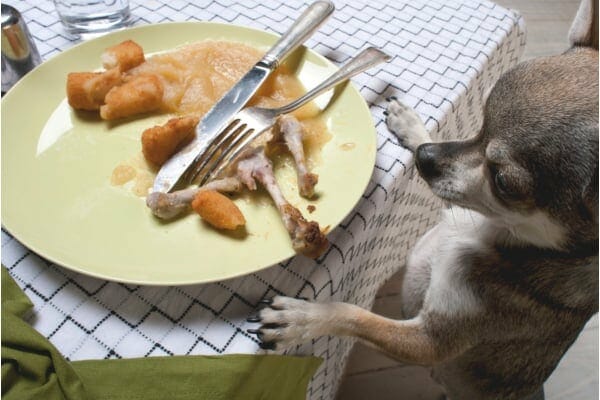
but they can splinter and cause serious problems.
10. Alcohol
As much as some human guests may enjoy a glass of wine with dinner or a beer during the big game, alcohol should never be shared with your dog—even if he is over 21 in “dog years.”
Alcohol can cause stomach upset, incoordination, seizures, hypothermia, and loss of consciousness in dogs. Be sure to keep your pooch away from any unattended glasses within reach this Thanksgiving, and have him or her stick to the water bowl instead.
Bonus dangers: Dessert!
Is there room for dessert? Now that we’ve discussed the main meal, let’s dive into the hidden dangers lurking behind three Thanksgiving dessert items.

1. Chocolate
You might already know that chocolate is toxic for dogs. The toxic compound, called theobromine, is present in differing amounts depending on the type of chocolate. Darker, more bitter chocolates have higher amounts of theobromine while white chocolate has very little. Baking chocolate has the highest concentration of theobromine.
If your dog consumes white chocolate, then he or she could develop mild gastrointestinal upset. But severe toxicity from darker chocolates can result in tremors, seizures, and even heart failure. The severity of your dog’s clinical signs will depend on body weight and the amount of theobromine that was consumed. For more about chocolate toxicity, please read my article: Can Dogs Eat Chocolate?.
2. Artificial sweeteners
The active ingredient in most artificial sweeteners is xylitol, or sugar alcohol. The xylitol (also called birch sugar) in our human foods does not cause our pancreas to release insulin, so xylitol is relatively safe for human consumption.
However, xylitol ingestion in dogs causes rapid release of insulin from the pancreas. When this happens, your dog’s blood sugar may become so low that he or she may even have seizures. Xylitol toxicity can also cause liver failure and even death.
Artificial sweeteners like xylitol can be found in many products, including baked goods, sugar-free chewing gum, peanut butter, cranberry sauce, jams, jellies, and toothpaste. Xylitol and dogs don’t mix. Know the poisons in your pantry and be proactive about protecting your dog.
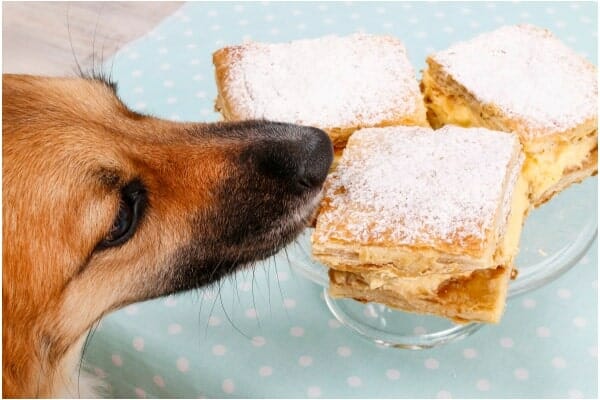
3. Nuts
Nuts can be found on many of our Thanksgiving tables, specifically in many of our Thanksgiving desserts. Please keep in mind that whole nuts may be a choking hazard, especially for small breed dogs.
One particular nut that is toxic to dogs is the macadamia nut. The mechanism of action is still unknown, but if your dog eats macadamia nuts, then he or she may experience lethargy, fever, vomiting, and may stumble when walking. Make sure to call your vet right away if your dog ingested macadamia nuts or has any of these symptoms.
Keep veterinary phone numbers handy
Thanksgiving (and all holidays) are a time of year when pet parents need to be vigilant about what their dogs might get into. Unfortunately, every year, cases of food toxicity in dogs always increase during the holidays. “Black Friday” can sometimes become “pancreatitis Friday” for veterinarians.
You can help your dear dogs by keeping these food items out of reach and asking your guests to do the same. However, if accidents happen—as they often do—then be sure to keep important phone numbers handy. If your regular veterinarian will be closed on Thanksgiving Day, then make sure to save the number for the nearest emergency veterinarian.
Poison control helplines are also available 24/7. They can talk you through the next steps if your pet eats something that he or she shouldn’t. The ASPCA poison control hotline is run by brilliant, board-certified veterinarian toxicologists. (Be advised that there may be a fee for the service.) I think every pet owner should keep their phone number readily available.
Mind the trash!
With a long list of potential Thanksgiving toxins, please keep in mind that scraps and bones that we throw away may be too tempting to even the most well-trained pup. Make sure your dog is supervised and/or kept away from the trash until it can be safely secured and disposed of.
I think we can all agree that some pie and a nap is a much better way to spend Thanksgiving evening than a trip to the emergency vet.
Be prepared
By being prepared and knowing what foods are safe (and what ones are not), you and your beloved dog can enjoy a wonderful Thanksgiving meal together. And if you are with family and friends during the holidays, share this list of foods with them.
Enjoy planning your dog’s (small) Thanksgiving plate, and have a safe and happy holiday!
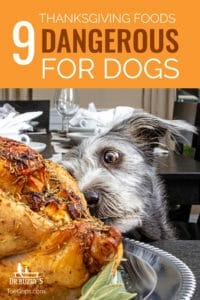
What safe foods do you give your dog at Thanksgiving? Which do you avoid?
Please comment below.


We welcome your comments and questions about senior dog care.
However, if you need medical advice, diagnosis, or treatment, please contact your local veterinarian.